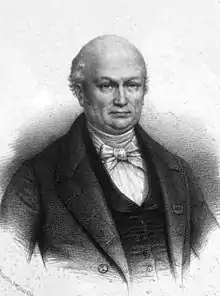Étienne Geoffroy Saint-Hilaire
Étienne Geoffroy Saint-Hilaire (15 April 1772 – 19 June 1844) was a French naturalist who established the principle of "unity of composition". He was a colleague of Jean-Baptiste Lamarck and believed in the underlying unity of organismal design, and the possibility of the change of species in time. He collected evidence for his claims in comparative anatomy, paleontology, and embryology.
Étienne Geoffroy Saint-Hilaire | |
|---|---|
 Geoffroy, aged about 70 | |
| Born | 15 April 1772 Étampes, Seine-et-Oise |
| Died | 19 June 1844 (aged 72) |
| Nationality | French |
| Scientific career | |
| Fields | naturalist |
| Institutions | Muséum National d'Histoire Naturelle |
| Influences | M. J. Brisson, Jean-Baptiste Lamarck, Lorenz Oken, Georges Cuvier |
| Influenced | Robert Edmond Grant |
Geoffroy's theory
Geoffroy was a deist, which is to say that he believed in a God, but also in a law-like universe, with no supernatural interference in the details of existence. This kind of opinion was common in the Enlightenment, and goes with a rejection of revelation and miracles, and does not interpret the Bible as the literal word of God.
Geoffroy's theory was not a theory of common descent, but a working-out of existing potential in a given type. For him, the environment causes a direct induction of organic change. This opinion Ernst Mayr labels as 'Geoffroyism'.[1] It is definitely not what Lamarck believed (for Lamarck, a change in habits is what changes the animal). The direct effect of environment is not believed today by any main-stream evolutionist; even Sir William Lawrence knew by 1816 that climate does not directly cause the differences between human races.[2]
References
- Mayr E. 1982. The growth of biological thought: diversity, evolution and inheritance. Harvard. p262 et seq
- Sir William Lawrence, 1st Baronet FRCS FRS (Cirencester, 16 July 1783 – London, 5 July 1867). He held pre-Darwinian ideas on man's nature and, effectively, on evolution.